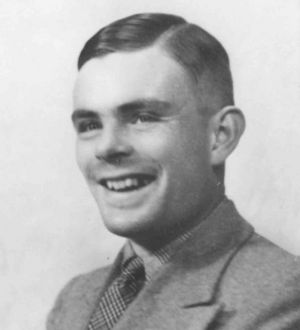Alan Turing
Alan Turing (1912 - 1954) was a British mathematician who contributed to modern computer science and cryptography.[1]
The Turing Machine
In the 1930s Turing proposed the concept of a "Universal Turing Machine". Turing had, first, proposed that the operations needed to calculate any formula could be broken down into a base set of instructions (or primitive recursive functions) that could in principle be followed by a machine: the "Turing Machine". Once fully formalized the calculations needed to derive the instructions themselves were capable of being run by a Turing Machine. The looped logic allowed the conception of a Turing Machine that could create its own instruction and, in principle, run a huge variety of calculations. Turing then used the concept of Universal Turing Machine to prove the undecidability of the halting problem.
Code breaking
During World War II Turing was assigned to the codebreaking unit at Bletchley Park, where he worked on the decoding of the German's Enigma machine. Turing and his colleagues played a significant role in the Allied victory in WW2, allowing Allied forces access to German communication networks throughout much of the war.
Artificial intelligence
In his 1950 paper "Computing Machinery and Intelligence" (Mind 49: 433-460) Turing proposed a test (apparently heavily influenced by Logical Positivism) for establishing whether a computer could think (see artificial intelligence). This test, the turing test, is still widely considered to be the best test of whether a machine exhibits artificial intelligence.
Death
Turing committed suicide by eating a poisoned apple after he was forced to take hormone treatment as part of his punishment for being convicted of homosexual acts. On September 10, 2009, British Prime Minister Gordon Brown issued a statement to celebrate Turing's "contribution to Britain’s fight against the darkness of dictatorship" and to acknowledge that his prosecution was "appalling" and "utterly unfair". "I am pleased," Brown stated, "to have the chance to say how deeply sorry I and we all are for what happened to him."[2]
Turing also became an atheist after his friend Christopher Morcom died [1].
References
Online biography: http://www.turing.org.uk/bio/
Computing Machinery and Intelligence: http://cogprints.org/499/00/turing.html
Oddballs and Eccentrics. Shaw, Karl. Edison, New Jersey: Castle Books, 2004.
